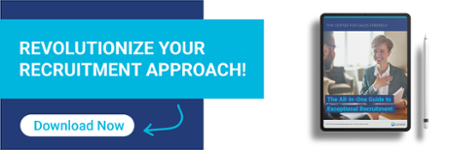
Have you ever hired someone who seemed perfect on paper, but ended up being a terrible fit for your team? What about someone who blew you away during the interview process, but then turned out to be a totally different person once you brought them on board?
If we each had a crystal ball to gaze into, the hiring process would be so much easier. Instead, hiring the wrong person is oftentimes a tough learning experience.
Here are five important lessons every hiring manager needs to learn. Keep reading to avoid learning them the hard way!
Lesson 1: You’re Always Hiring
Recruiting is like prospecting in sales. Just because you close a deal, it doesn’t mean you don’t still have to prospect the next day! The same can be said for recruitment. Just because you have a full team, it doesn’t mean you don’t still need to recruit. Imagine your target accounts are your future employees.
Adopt a “we’re always hiring” mindset where recruitment is happening all the time, whether or not you have an open position. Then, you’ll have a full bench to pull from when it comes time to make a hire down the road. Finding and hiring top talent is challenging. It’s even more challenging if you don’t have a strong talent bank to pull from.
Set aside time for recruitment each week in the same way your Account Executives set aside time to prospect.
Lesson 2: Don’t Compromise on Your “Must-haves”
Identifying the right talents, skills, and experience is crucial when building a high-performing team. Equally important is refusing to compromise on those things when it comes time to hire someone for the position.
Talent bank deposits will come with many different combinations of talents, skills, and experiences. Talent is someone’s innate ability; it doesn’t change over time, and it can be measured through a validated talent assessment. Skills and experience are learned and gained over time.
For example, imagine you’re hiring someone who will primarily have a new business development role. A must-have may be the talent of Relationship, so they easily and quickly connect with others. It would be wonderful if they came in with a strong network of prospects and had a background knowledge of the industry, but those two things aren’t deal breakers. They could be acquired over time with experience within your organization.
Determine your talent, skills, and experience “must haves” and never compromise on them.
Lesson 3: Cultural Alignment Can’t Be Overlooked
Cultural alignment plays a significant role in the success of your team. Hiring candidates who align with your organization's Reason for Being and Core Values can lead to greater employee engagement, increased productivity, and higher revenue.
Assess cultural alignment during the interview process by utilizing questions that probe into the candidate’s values and beliefs. For example, if one of your Core Values is Integrity, consider asking, “Tell me about a time you witnessed someone do something against company policy.”
If the candidate’s answer is they brushed it under the rug, or worse, the person got away with it - so they followed suit - that’s NOT the cultural alignment you’re looking for. It’s time to move on from that candidate!
Lesson 4: References Aren’t Limited to What the Candidate Provides
We’ve all been in the position to provide someone with references to check. More than likely, you chose people who you KNEW would sing your praises, no matter what. Candidates are doing the same thing. References a candidate provides are certainly worth checking, but the most valuable references you can check are those that aren’t listed on the resume.
Always consider connecting with someone’s previous colleagues and managers. They can provide valuable insights into a candidate’s soft skills, motivations, and compatibility with your team. It’s also helpful to dig into your own network of people. Odds are, you can play “6 Degrees of Kevin Bacon” and gain some additional knowledge from someone you may not have thought to connect with before.
Remember, the more information you have, the more informed your hiring decision will be.
Lesson 5: Always Create a Positive Candidate Experience
Every candidate’s experience with your organization matters, regardless of whether or not the candidate is selected. If you do a great job, candidates will feel positive about your company and may even share those positive feelings with others. If you do a poor job, candidates will also share their feelings with others, but they’ll be negative feelings that have a poor impact on your company’s employer brand.
By creating a positive candidate experience throughout the hiring process, your organization will attract top talent and build a reputation as an employer of choice. Think of your job candidates not just as future employees, but also as referral sources, customers, and marketers.
Conclusion
Hiring a new employee is a tough job! An even tougher job is bringing the wrong person on board and trying to manage someone who simply doesn’t align with your team. Be proactive and put in the necessary effort throughout the hiring process to ensure you’re bringing the right people on board. As Jim Collins said, “People are not your most important asset. The right people are.”





